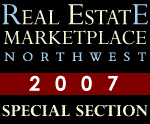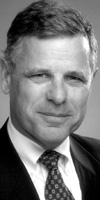
Surveys
DJC.COM
December 7, 2007
CBA Insights speaker profile: John Parker
For CBA

Firm: Kennedy Associates Real Estate Counsel
Position: President and CEO
John Parker is a founding principal of Kennedy Associates Real Estate Counsel. He was director of acquisitions until March 2007, when he assumed the position of president and CEO. As a member of the firm’s investment committee, he participates in all strategic considerations for the Kennedy portfolio. Parker holds an MBA degree from Harvard University and a bachelor’s degree in economics and mathematics from Stanford University. In addition, he is a licensed real estate broker in the state of Washington and is a member of the Urban Land Institute. Kennedy Associates has nearly 30 years of experience as an institutional real estate investment advisor in all property types. The firm has invested in and managed $12 billion in development, redevelopment and existing properties in major markets across the United States.

|
How did you get started in the real estate investment business?
I was interested in building blocks when I was a young kid and intrigued with constructing things. At Harvard, I took every real estate course they offered, all of three. My first job out of business school was in my native northern California, where I worked for The Gap. The intent was to get involved in the real estate side of that business, which was growing rapidly, but that didn’t happen, and I mostly ran some stores, learning operations.
After that I landed a job with a St. Louis firm looking for a manufacturing site in the Pacific Northwest. That’s how I arrived in Seattle.
| Getting personal with John Parker |
|
Q: If you could own any property in the world, what would it be? A: It would be an opportunity where we could build a state-of-the-art, transit-oriented, environmentally responsible project. That’s what excites us — the opportunity to create value. Q: If you ran into 22-year-old John Parker today, what advice would you give him? A: You’re going to be around a long time — pursue your passion, pursue what excites you. Q: What is one thing about you that would surprise people? A: I belong to a biking group with about 20 other local professionals. We ride all over the world. I just got back from biking in Spain. Q: Looking back on your career, what business deal comes to mind that makes you smile? A: The development of Pacific Place and its enormous impact on downtown Seattle. It completely revitalized the retail core of Seattle. |
I met Duff Kennedy in late ‘70s. He had a large stock and bond money management firm that included some mortgages in Alaska during the post-pipeline era. As the economy slowed after the pipeline boom, Duff hired Jim Snyder and me as consultants to straighten out the mortgage portfolio.
Duff took note that his clients liked real estate investments and suggested we join him and form a firm that invested in real estate on behalf of pension fund clients. We thought that was a great idea, so we closed down our small brokerage firm and joined Kennedy Associates.
It has grown substantially from that. Duff was handling the stock and bond side of the company and, when he retired, we decided to focus the company solely on real estate and became strictly a real estate investment advisory firm, as that’s what we enjoyed and did best.
What is your role as leader of Kennedy Associates?
I’m responsible for the overall direction of the company, the strategy and vision. How we attract capital and invest our client’s capital in the U.S. It is all domestic investment and the majority of our clients are an outgrowth of Duff Kennedy’s client base.
What would one of your clients say is a “Kennedy asset” as a company?
The common thread that runs throughout our mindset as real estate investors on behalf of pension funds has been a value-added strategy, long before that terminology became the catchphrase in the institutional investment world. Part of that is driven by the fact that a good chunk of our client base is Taft-Hartley joint management/labor trusteed pension funds and as such we invest quite a bit in new construction which is 100 percent union-built.
That’s an outgrowth of the appreciation for the client base we have and an important part of their outlook on how they would like to invest in real estate. So a good portion of our activity is focused around development joint ventures or substantial renovations or rehabilitations or change of use.
Our value-added strategy includes the ability to build as well as buy as market conditions dictate. We take advantage of opportunities where we can create value through active management, construction and development.
What is Kennedy’s strategy for investing in existing property?
Kennedy retains a healthy skepticism for conventional wisdom and a demonstrated discipline to not buy when markets are overheated and/or when specific asset pricing would produce inferior risk-adjusted returns. This trait and approach has served us well through the market cycles over the past 30 years.
We are adamant that initial pricing must be at or below replacement cost, producing competitive current income returns. This, coupled with the opportunity to grow income and value, is key to successful investing in real estate. We focus on a limited number of primary and secondary markets that are continually examined for overall strength and growth potential, and aggressively vet select investment opportunities.
Tell us about Responsible Property Investing?
We believe that five to 10 years from now if the buildings in your portfolio are not LEED qualified or in some form or fashion identified as not having major elements of sustainability, then you’ll be at a competitive disadvantage and, frankly, your buildings will sell for less.
We are one of the founding members of the Responsible Property Investing group, which is an industry group that is taking a broader approach then just thinking “green.” We incorporate a number of issues as we consider how we build responsibly; how we build with green issues in mind but with a broader palette.
We are fully invested in this effort. A large part of this is social responsibility. We work exclusively with responsible contractors and development companies that honor fair labor laws and foster positive work environments. Because so many of Kennedy’s development projects are high profile with significant capital involvement, Kennedy is able to create significant job growth and support responsible contractors in local communities.
As an investment fiduciary, we have found that reducing energy consumption through conservation and technology not only promotes environmental stewardship, but also results in higher yields for our clients through reduced operating expenses.
Other Stories:
- Commercial real estate continues its strength
- Retail evolves in mixed-use projects
- Use cost segregation to cut Uncle Sam’s bite
- Too many condos in Seattle? Think again
- An urban village emerges on Seattle’s First Hill
- Pros and cons of the Industrial Jobs Initiative
- What’s next for Seattle’s CBD office market?
- Developing retail? Here are some things to know
- Downtown becomes too pricey for disabled homeless
- Workforce housing shortage is a ‘silent epidemic’
- Now is the time for apartments — but beware!
- Will good times continue for our market?
- Full speed ahead as CBA turns 30
- CBA Insights speaker profile: Dennis Wilde
- CBA Insights speaker profile: Linda Berman
- Hot Eastside office market won’t get red hot
Copyright ©2009 Seattle Daily Journal and DJC.COM.
Comments? Questions? Contact us.